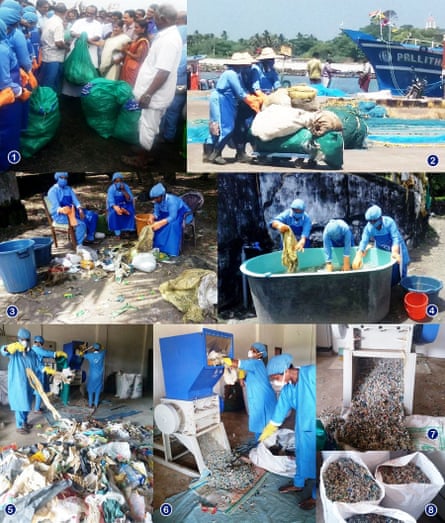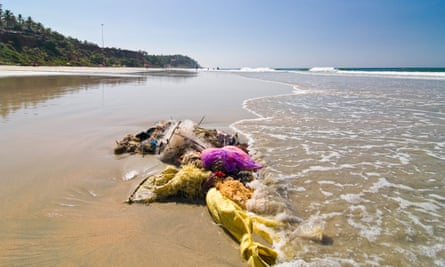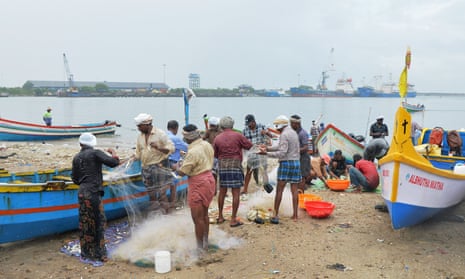For years, plastic caught by fishing communities on the Kollam coast in India’s southern state of Kerala was thrown back into the water, damaging aquatic ecosystems and killing fish.
But fishers are spearheading an innovative initiative to clean up the ocean – along with their daily hauls of fish, they pull in and collect the waste that gets enmeshed in their nets.
Bottles, ropes, toys, shoes, discarded fishing nets and polythene bags are sorted, washed, shredded, before being recycled into material added to asphalt to help to build local roads.
In 2017, the Keralan government’s harbour engineering department (HED) launched its Suchitwa Sagaram (Clean Sea) initiative, providing nylon bags to the 1,000-odd fishing boats for the crew to collect the rubbish. The plastic is processed onshore and fed into a shredding machine, then sold on to roadbuilders.
Nearly 3,000 fishers and boat owners in Kollam are involved in the initiative. Now the programme is expanding to other harbours and with one million people working in the fishing industry in Kerala, of whom 25% are directly involved in fishing, scaling up the project could have a real impact.
Peter Mathias, president of the All Kerala Fishing Boat Operators’ Association, says: “Previously, we didn’t care much about the plastic we collected in our nets. We’d simply take the fish and toss the rest back into the ocean. But not any more – we’re now protecting the ocean to save our livelihoods. Had we continued to be reckless, there wouldn’t have been any more fish for us to catch.”
Washing and sorting the collected plastic is also providing jobs to a small group of local women in a traditionally male-dominated sector. “Most of the garbage is too mangled to recycle in traditional ways. So we shred it into strips and sell it to local construction companies, who mix it with asphalt to construct roads. This helps us pay the women’s salaries. This road surface is increasingly popular as it makes the roads more resilient to India’s extreme heat,” says VK Lotus, an engineer with the HED.

“Every kilometre of plastic road uses the equivalent of a million plastic bags, saving around one tonne of asphalt. This not only saves the environment but also cuts costs by roughly 8–10% per kilometre of road paved with plastic as compared with a conventionally built road,” she says.
Since its launch, about 80,000kg of plastic waste has been collected from the seas off Kollam, of which more than half was recycled to lay 84 miles (135km) of road.
The project has resonated with many fishing communities – including clam collectors and divers – along Kerala’s 375-mile (600km) coastline. Other groups are now approaching government departments and aid organisations to mobilise funds to help launch their own plastic collection and recycling programmes.

The initiative has not only brought in tangible economic gains for Kollam but ushered in a major shift in the fishing community’s perspective about their environment. They now try to ensure that local people and tourists do not litter the land or sea with rubbish, and have pledged to cut back on their own use of plastic. “Our boats also carry stickers to create awareness against marine pollution,” adds Mathias.
However, due to the Covid pandemic, the project has hit a bump. Work has slowed down and with rising fuel prices, fewer fishing boats are going to sea.
“On average,” says Mathias, “a vessel travels 45 kilometres into the ocean to fish, requiring 500 litres of diesel. However, the government has stopped our diesel subsidy, so we now have to pay about 80p for one litre of diesel instead of the previous 55p. This has affected our income drastically.”
But the project must continue, says Mathias, who believes the community has never before been so united and effective in protecting the ocean.
“Our future depends on it. Our children are also getting inspired, which can be life-transforming,” he says.
